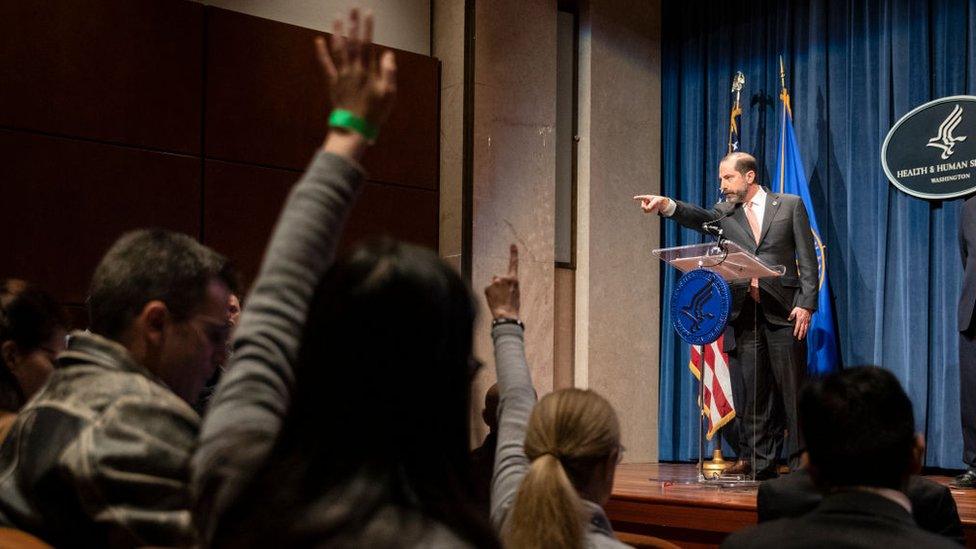US places new restrictions on Chinese journalists
- Published

The US health secretary briefs reporters on Covid-19, which originated in China
The US is placing new restrictions on Chinese news outlets, forcing them to cut nearly half their US-based staff.
The move to limit the number of reporters is being seen as a retaliation for Beijing's expulsion of two US journalists last month.
Five Chinese state outlets will be forced to reduce their US staff by 40%.
US officials accused China of a crackdown on free speech not seen since the Soviet Union at the height of the Cold War.
The US state department said it was hearing of increasing harassment and surveillance of American and other foreign journalists in China.
US Secretary of State Mike Pompeo said in a statement that five media outlets, including China's official news agency Xinhua, would be required to reduce their total number of staff to 100 from 160.
The rule change also applies to China Global Television Network, China Daily, China Radio International and the People's Daily.
People's Daily will not have to shrink its US staff, because none of its workers are Chinese nationals.
Although the journalists will not be forced to immediately leave the US, their visas are tied to their employment, making it very likely that they must go once they are axed.

Journalists in the cross-fire
Zhaoyin Feng, BBC Chinese in Washington
This is an unprecedented move by the US government, which is currently not placing caps on US-based journalists from any other countries.
The five affected Chinese state media are the crown jewels of China's propaganda media operation. Xinhua and People's Daily have hundreds of millions of readers in China, with numerous smaller state media agencies reprinting their news reports. China Daily, China Global Television Network and China Radio International, which report in English, mainly target the foreign audience.
China has implemented unofficial visa caps for foreign reporters for years. The US' latest move aims to establish what Mr Pompeo called a "long-overdue level playing field", but it is likely to fuel the increasingly acrimonious diplomatic tit for tat between Beijing and Washington, with journalists caught in the crossfire.
Beijing will likely accuse the US of damaging freedom of the press. When the Chinese government faced criticism regarding the expulsion of three Wall Street Journal reporters last month, China's foreign ministry spokeswoman Hua Chunying returned fire on Twitter: "Freedom of press? Do not forget how the White House treated CNN."

Mr Pompeo said the decision did not place any restrictions on what those media outlets could report on in the US.
"It is our hope that this action will spur Beijing to adopt a more fair and reciprocal approach to US and other foreign press in China," said Mr Pompeo.
"We urge the Chinese government to immediately uphold its international commitments to respect freedom of expression, including for members of the press."
A US official who spoke on condition of anonymity told reporters the US was making the move in an effort to seek "reciprocity" and a "level playing field".
The companies have until 13 March to downsize their staffs. US officials noted that only about 75 US journalists are believed to be currently working in China.
What is the background?
Last month, the US said it would require Chinese journalists working for the five companies to register as "foreign agents" because "they are effectively controlled" by the Chinese government.
The next day, China expelled three reporters from the US-based Wall Street Journal over a coronavirus editorial that China called "racist".
The journalists, two of whom were American, had no role in writing the editorial, headlined "China Is the Real Sick Man of Asia".
It comes as the US condemns China for its treatment of their Muslim Uighur population and warns of the risks of adopting 5G internet equipment from the Huawei technology firm.
On Monday, the Foreign Correspondents' Club of China (FCCC) warned that Beijing was using visas as "weapons against the foreign press like never before".
In a report, the FCCC said that 82% of journalists in the country had experienced interference, violence or harassment while working.
"As China reaches new heights of economic influence, it has shown a growing willingness to use its considerable state power to suppress factual reporting that does not fit with the global image it seeks to present," the organisation said in a report titled "Control, Halt, Delete".
Press freedom in China
In 2019 Reporters Without Borders ranked China 177 of 180 countries for press freedom, external, after measuring media independence, respect for safety and freedom of journalists, and pluralism
The BBC is blocked in China and in 2019 it launched an international news website on the dark web via Tor, in an attempt to thwart censorship attempts by governments including China
Nine journalists have been either expelled or effectively expelled through non-renewal of visas since 2013, according to the Foreign Correspondents' Club of China

- Published19 February 2020
